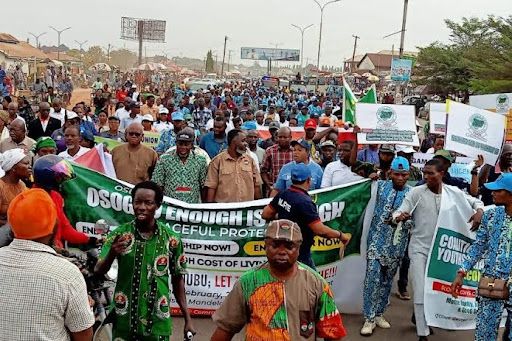The Nigeria Labour Congress (NLC) and federal government workers have called on President Bola Tinubu’s administration to urgently review the national minimum wage, warning that the current ₦70,000 benchmark is no longer sustainable in the face of skyrocketing living costs.
The demand follows recent moves by several states to increase workers’ pay above the federal minimum. On August 27, 2025, Imo State raised its minimum wage to ₦104,000, after earlier increments in Lagos, Rivers, Bayelsa, Niger, Enugu, Akwa Ibom, Ogun, Delta, Benue, Osun, and Ondo States.
Workers argue that inflation and rising costs of food, rent, transportation, and electricity have eroded the value of the ₦70,000 wage, which was signed into law in July 2024.
Mr. Benson Upah, Acting NLC General Secretary, told NAN:
ALSO READ: Nigeria’s N70k minimum wage insufficient amid steep poverty – US govt
“The truth is that ₦70,000 is not sustainable under the present economic situation. Workers are under immense pressure, and unless the government responds quickly, the crisis of survival will only worsen.”
Upah said while labour would continue dialogue with the government, industrial action remains on the table if nothing changes.
Similarly, Mr. Shehu Mohammed, President of the Association of Senior Civil Servants of Nigeria (ASCSN), praised states that raised wages and described it as a “wake-up call” for the federal government.
“Our demand from the beginning was ₦250,000 as a living wage. ₦70,000 only takes a worker to the office gate, not back home,” he argued.
Civil servants also voiced their frustrations, Mrs. Kemi George, a federal worker, lamented:
“By the time I pay transport and buy food, nothing is left. Rent and school fees are almost impossible to cover.”
Another worker, Mr. Obi Chimaobi, described the situation as unbearable, saying ₦70,000 cannot sustain a family.
ALSO READ: FG moves to increase Tinubu, Shettima, Akpabio, others’ salaries
“With ₦70,000, you are already in debt before the month ends. Government must act very fast,” he warned.
Labour leaders maintain that wage adjustments, complemented by policies to reduce living costs, will not only restore dignity to Nigerian workers but also stimulate the economy through increased spending.
>
